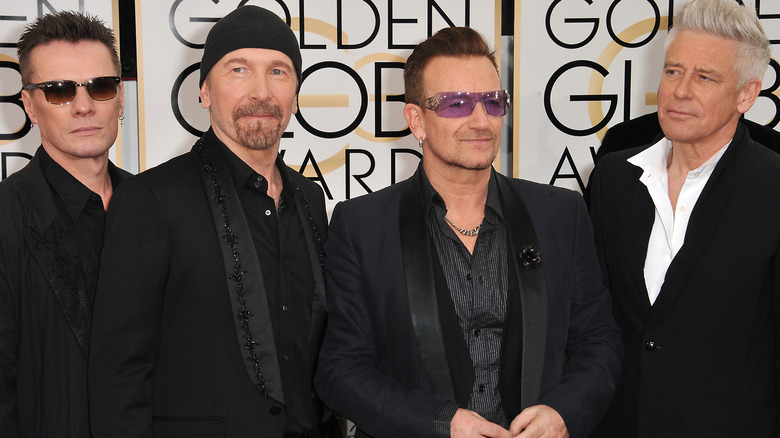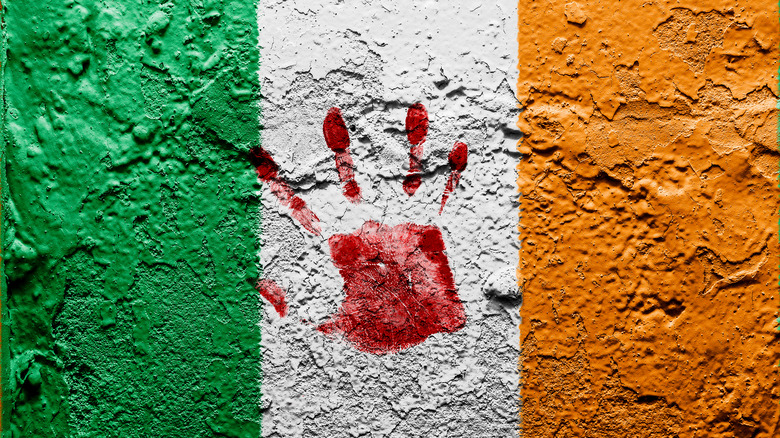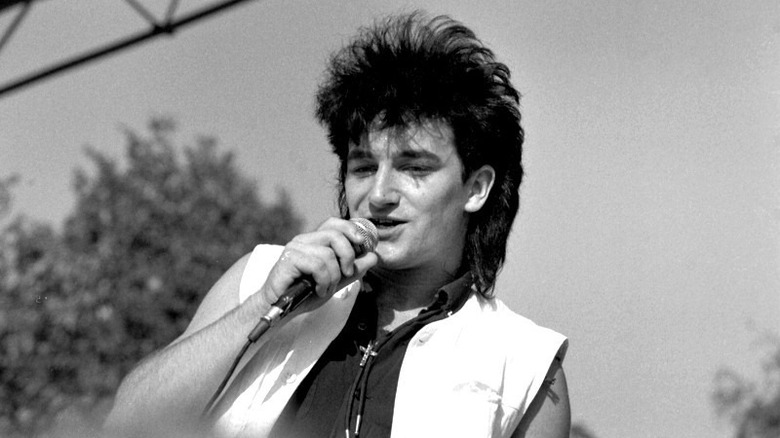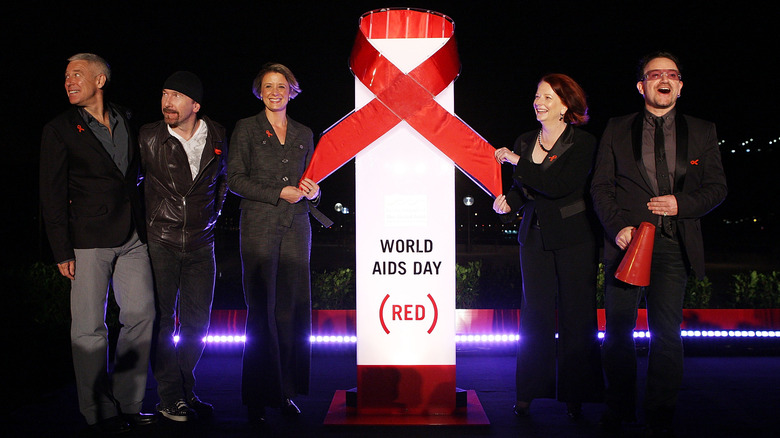The Truth About The Christian Background Of U2
For fans of U2, the band's "will they, won't they" relationship with Christianity isn't anything new. U2's entire discography has laid bare their spiritual evolution, in stage-by-stage crises and self-reinventions. The innocent hopefulness "With a Shout (Jerusalem)" from "October" (1981) gave way to the victorious refrain of unity from "Where the Streets Have No Name" on "The Joshua Tree" (1987). That era transitioned to the God-blaming world-weariness of "Wake Up, Dead Man" from "Pop" (1997), which gave way to the ecumenical "let's all just love and toss away our bombs" ethos of everything since "All That You Can't Leave Behind" (2000).
Part of the confusion about U2's "Christian" identity comes from the simple fact that they don't call themselves a Christian band, as The New Yorker points out. Musicians often overtly brand themselves as Christian-affiliated, and thereby instantly alienate a massive segment of the population. But it's not like U2 has been hiding their faith; they just don't blab about it. They've done what artists arguably should do: let their work speak for itself. By this simple act alone, Bono and the gang have taken the humble and modest route, and disproven their mid-career reputation and image (circa "Achtung, Baby" through "Pop") of being pompous and self-absorbed rock stars.
But what do Bono, the Edge, Adam Clayton, and Larry Mullen actually believe? The truly Christian answer would be, "None of your business, that's between them and the Almighty." We can, however, talk about their actions, statements, and background.
Born and raised amidst The Troubles in Ireland
To understand U2's relationship with Christianity, we've got to go back to their upbringing and self-identity. As Britannica states, frontman Bono (born Paul Hewson) and drummer Larry Mullen were both born and raised in Dublin, Ireland. Guitarist and multi-instrumentalist the Edge (born David Evans) and bassist Adam Clayton were born in England and grew up in Dublin. All four of them attended Mt. Temple School in the 1970s (via Mount Temple). There, while starting to make and play music together, they found themselves drawn to the social issues of the day.
U2 grew up smack dab in the middle of "The Troubles" (1968-1998), a period of bloody internal conflict within Ireland marked by regional differences between south (the Republic of Ireland, a part of the EU) and the north (Northern Ireland, a part of the UK) (via the BBC). The Troubles were exacerbated by a deep religious split between Catholic and Protestant, with the Republic of Ireland being majority Catholic and Northern Ireland being majority Protestant. Religion wasn't the problem, per se, but rather that Catholics in the north faced discrimination, economic insecurity, gerrymandering, and the like. This all came to a head on Bloody Sunday in 1972, when British paratroopers intervened amid growing tensions and opened fire into a crowd of protestors (via History). U2 wrote about this in the song "Sunday Bloody Sunday" from 1983's "War." Is it any wonder, then, why U2 developed a preoccupation with spiritual and religious questions?
The meaning of the words
When looking at U2's relationship to Christianity, we've got to look at the band's lyrics. After all, music — just music — can't be Christian or not; music simply is. Lyrics are necessary to project a certain message. For that, we turn to U2's chief lyric writer and lead singer, Bono.
Bono spoke about the interplay between words and music to the Los Angeles Times, saying, "Songwriting comes from a different place ... Music is the language of the spirit. I think ideas and words are our excuse as songwriters to allow our heart or our spirit to run free. That's when magic happens." If Bono is letting his heart "run free" when he writes lyrics, then it stands to reason that his personal beliefs would come out in his work, same as any important issue to any creative.
To the point, loads of U2 lyrics make blatantly Christian pronouncements. "I Still Haven't Found What I'm Looking For" states, "I believe in the Kingdom Come / Then all the colors will bleed into one / Bleed into one / But yes, I'm still running / You broke the bonds and you loosed the chains / Carried the cross of my shame / Of my shame / You know I believe it." When U2 performs this song, Bono says, "It's like God suddenly walks through the room. It's the point where craft ends and spirit begins. How else do you explain it?"
Dreams of peace, charity, and love
At this point, only one member of U2, bassist Adam Clayton, has stated outright that he isn't Christian (via the Banner). But, U2 doesn't need Christian theology to get their point across. "Rejoice," "Pride (In the Name of Love)," "One," "Peace on Earth," "Grace," "Love and Peace or Else," "Lucifer's Hands:" all of these tracks and many, many more, drive home the same "universal peace and love" message typified in songs like "Imagine" by John Lennon. That being said, there's no reason to ever say "no" to a rocking gospel version of "I Still Haven't Found What I'm Looking For" from Harlem (from 1988's "Rattle and Hum," watchable on YouTube).
U2 hasn't merely sung about peace, charity, and love, they've put those words into action throughout the years. As a band, they've been involved in numerous charity concerts such as Live Aid (1985), Amnesty International's A Conspiracy of Hope (1986), Self-Aid, which supported homeless individuals in Ireland, and Live 8 in London (2005), which funded the Make Poverty History campaign (via the Borgen Project). U2 even straight-up donated €10 million (over $10 million) for protective equipment for frontline healthcare workers during COVID-19.
Bono himself, ever since a fateful trip to Ethiopia during its famine in the 1980s (via World Vision), has been extremely active in charity and philanthropy. He co-founded RED in 2006, for instance, which raised over $600 million as of 2020 for AIDS prevention and treatment on the African continent.
The balancing act of religion and fame
Even though the Christian elements of U2's music are quite clear when you read or listen to their lyrics, plenty of folks have put the question to the band over the years. When speaking to Focus on the Family, a support-and-community organization for Christians, Bono bluntly said, "I believe that Jesus was, you know, the Son of God," and echoed a challenge once set forth by Christian writer C.S. Lewis, saying, "When people say [Jesus was a] 'good teacher,' 'prophet,' 'really nice guy' ... this is not how Jesus thought of himself ... either Jesus was who he said he was, or he was a complete and utter nut case. You have to make a choice on that" (via Deseret News).
Such direct statements highlight what has a been a career-long issue for U2, one that contributes to the confusion surrounding their beliefs. Namely — to quote "Acrobat," from "Achtung Baby" (1991) — how can the group "talk like this and act like that"? In other words, how can they maintain their balancing act of contrite Christian ethics mixed with an on-again, off-again smoking-drinking rock-and-roll image? Is there contradiction between enjoying a Guinness and being a moral person. To this Bono said, "You've gotta be very careful that grace and politeness do not merge into a banality of behavior, where we're just nice, sort of 'death by cupcake.'"
Prayer in private and song in public
Bono has gone one further than professing Christian beliefs to interviewers. In 2013, he told RTE One in Ireland (via HuffPost), "I pray to get to know the will of God, because then the prayers have more chance of coming true — I mean, that's the thing about prayer ... We don't do it in a very lofty way in our family. It's just a bunch of us on the bed, usually, we've a very big bed in our house. We pray with all our kids, we read the Scriptures, we pray." Bono even wrote stadium-filling evangelist Billy Graham a "thank you" poem in 2002, and took part in a concert celebrating Graham's 87th birthday (via Christian Post). Taking all this into account, and considering that Bono has remained married to the same, one spouse since 1982 (via Irish Central), there really isn't much for family-minded Christians to take issue with.
Judging by Bono's accounts, U2's music provides a small glimpse into a deeper, Christian reservoir; they keep much more to themselves than they proclaim publicly. As Rock n' Heavy points out, U2 has never approached their art as a means of proselytization, and have merely included themselves in their work, as a true artist should. It just so happens that when the band wrestles with religious and spiritual questions, they articulate some questions in a public-facing forum. Judging by the band's enduring popularity, it seems like folks are more than happy to listen.





